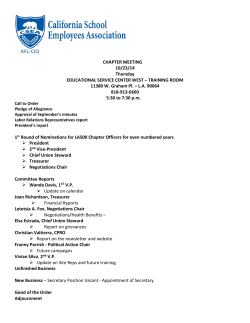
The Budget Phase - Unbalanced Budgets Don`t Count
The Budget Phase - Unbalanced Budgets Don't Count A Look at What Constitutes a Complete Budget When the revenue forecast was released on February 20th, we entered the budget phase of the legislative session and will soon begin releasing and passing proposals, followed by budget negotiations. It is worth taking a look at two key procedural steps as a preview of what is necessary to ensure timely adjournment of the legislative session. Step 1: Budget Release Date The legislative session is scheduled to adjourn April 26th. Last year, the 2014 session was the first in this decade that the Legislature adjourned on time, and we are in good position to make it two in a row. One key to this will be the budget release date. By tradition, it is the House's turn to first introduce and pass their version of the operating budget. With the revenue forecast moved up a month, the House would ideally introduce and pass its budget by March 23rd, with the Senate following shortly thereafter. This timeframe allows adequate time for the two sides to resolve the differences between the budgets and adjourn on time. Step 2: Passing a Complete Budget, Including Bills Necessary to Implement the Budget The second key is that each chamber passes a complete budget, meaning not only the budget (spending) bill but also the bills necessary to implement the budget. Olympia parlance labels these separate bills that make up the budget “Necessary to Implement the Budget” or NTIB. These bills include not just the spending allotments, but the necessary finance and revenue changes required by the spending allotments. It is not a real budget to simply pass a spending plan -- you must also pass the changes in law assumed in the budget. Why does this matter? Simply put, unbalanced budgets don't count. A budget that assumes taxes, but doesn't pass the stand-alone tax bill that would finance that level of spending is not a real budget. Likewise, a budget that assumes spending cuts but doesn't pass the stand-alone bills that makes those changes in law is not a real budget. Here are instances of where this may come into play in the coming weeks: ● Tax Increases -- In the 2003 session, with a 52-46 majority, the House Democrats assumed a $750 million tax package and wanted to begin negotiations without actually passing the tax bill. The Senate, at that time led by Ways and Means Chair Dino Rossi, insisted that the tax increases pass before negotiations commenced, otherwise there was no guarantee they would have the votes for a final completed budget. By the time the House was able to muster the votes for tax increases, they had been pared considerably along with the proposed spending level because they had been through a complete legislative process. Due to this pared spending level, the two chambers were able to negotiate a final budget that lived within the state's means. For negotiations to proceed in a timely fashion this year, any spending plan that spends more than current revenue must include the necessary tax increases as well as the votes to support it. ● Rainy Day Fund - 60% Vote -- The Governor's budget proposes using the constitutional rainy day fund as $450 million of his budget solution. Since we are in a period of economic growth, this action requires a 60% vote of the legislature. It is questionable whether such a vote could be achieved and is a dubious fiscal strategy given the purpose of the account is to provide a cushion in economic downturns. ● Initiative 1351 -- This initiative, passed by the voters in 2014, calls for $2 billion in additional spending over the next two years, and an additional $4 billion in the ensuing biennia. Simply suspending the initiative for two years, as the Governor proposes, doesn’t meet our state’s four-year balanced budget requirement, and would require a 2/3rds vote of the legislature. Any budget must address either funding the first 4 years of the initiative or correcting it in order to create a balanced budget. The bottom line is that a budget is not complete just because the spending plan is passed. To truly be a budget, and to be able to commence negotiations, the bills necessary to make that budget work must also be passed. Window's Reflection The budget goal should always be an on-time adjournment with a responsible and sustainable state operating budget. To reach that goal, both chambers must release their spending plans in coming weeks by passing all of the bills necessary to implement that spending plan. Only then can each budget be considered complete and negotiations to reconcile the differences begin.
© Copyright 2025





















